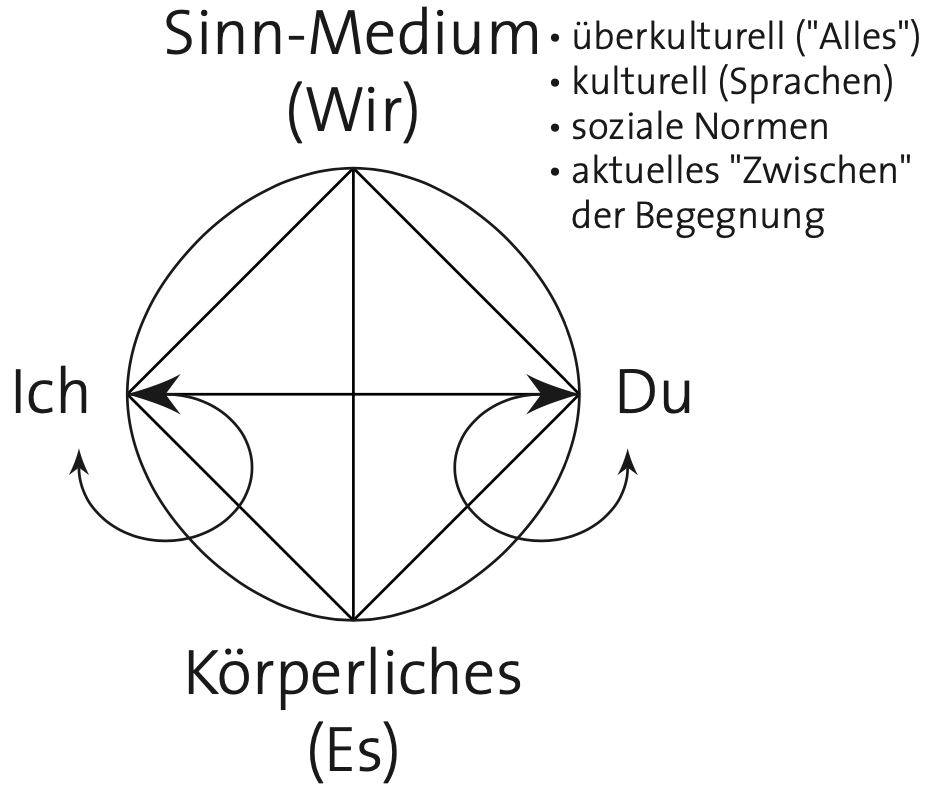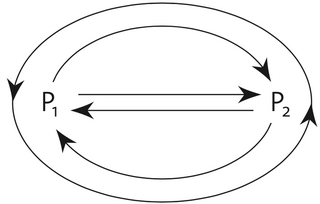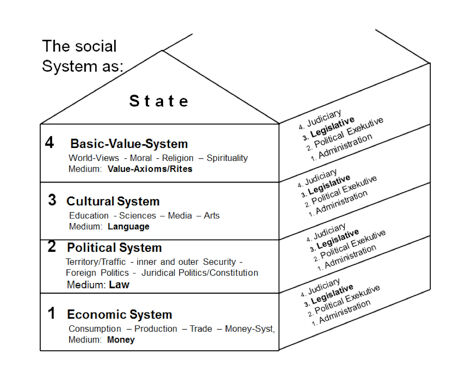"The form of government must be a transparent garment
that clings closely to the body of the people."
Georg Büchner
The Value-levels-democracy is a philosophically and system-theoretically grounded model that reflects the complexity of society and is therefore tailor-made for it. But before we discuss this socio-philosophical foundation in outline and present the derived concept of Wertstufendemokratie, let's ask ourselves: What is the state of our current democracy? Is it even worth considering new models?
Among critical contemporaries, this question can only be asked rhetorically. It has long been publicly acknowledged: the political parties have become "overwhelmed" (Sascha Lobo), mere "self-preservation systems," and election campaigns have turned into a "puppet show" (Richard David Precht). Innovative concepts are hard to find, and instead, there is a pervasive "forgetfulness of the future" (Harald Welzer). Activists are also sounding the alarm: the parties are acting "devoid of future" (Luisa Neubauer), and none of them is "even remotely capable" of fulfilling the Paris Agreement (Greta Thunberg). And popular opinion goes even further: it's not the people, nor the parties, but "money rules the world."
Why is this the case? In our opinion, the failure of democracy has mainly structural reasons:
-
Inadequacy and incompetence of the parties with unlimited responsibilities: Parties and representatives are elected to address all issues at once, which leads to their plain incompetence. Consequently, election campaigns and parliamentary debates lack substance. The crucial questions are not raised, and meaningful reforms are not discussed. The fundamental problem of how to solve the seemingly inevitable economic dependence of democracy is ignored. Instead of rationality and visionary leadership, we see party discipline, power struggles, self-presentation, group mentality, a backlog of reforms, and mere speculation about the supposed will of the people.
-
Lack of representativeness: Apart from the overall lack of substance in party programs, the all-encompassing responsibilities of parties give rise to numerous dilemmas during elections. For example, when one party is preferred on issue X (e.g., fiscal policy) and another on issue Y (e.g., foreign policy), it becomes challenging to make a choice. Moreover, in an election campaign that attempts to cover all topics at once, it is doubtful whether all issues are adequately addressed. In many cases, we are not adequately represented on various matters.
-
Structural corruption: The fact that politics primarily aligns with economic interests, despite constitutional guarantees of fundamental values and human dignity, stems from the aforementioned economic dependence in society. In a global market, capital chases maximum returns around the globe and pits states against each other as competitive investment and economic locations. This pursuit of profit undermines democracy, people, and the environment. When profit is hindered by state regulation, capital outflows and rising unemployment loom. These so-called "constraints" could, of course, be eliminated through a profound reform of our economic system. However, and here is the crux of the matter, which of the structurally irrational parties would genuinely be willing and capable of addressing this problem in all its severity and tackling it at its roots?
It should be noted that this is not merely the failure of individual representatives or parties (who can be seen as victims of the system), but rather structural problems that can only be solved structurally. So how can democracy be fundamentally developed?
"The state must be a garment that fits snugly to the
body of the people."
Georg Büchner
Value-levels-democracy is a model founded on fundamental
philosophy and system theory that reflects the complexity of
society and is therefore tailor-made for it. It was developed
by the social philosopher Johannes Heinrichs, a thinker
inspired by classical German philosophy, who managed to
synthesize his insight into the fundamental structure of our
conscious existence with modern dialogical and systemic
approaches to develop a comprehensive theory of society that is
confirmed in experience in a truly surprising way. But before
this social-philosophical foundation is at least outlined and
the value-graded democracy derived from it is presented: What
about our current democracy? Is it even worth thinking about
new models? Among critical contemporaries, this question can
actually only be asked rhetorically. It is long since publicly
stated: The parties are "overwhelmed" (Sascha Lobo), have
become pure "self-preservation systems", and election campaigns
are a "puppet show" (Richard David Precht); innovative concepts
are sought in vain, only encountering "future forgetfulness"
(Harald Welzer). Activists are also sounding the alarm: The
parties are acting "future-free" (Luisa Neubauer), and none is
"even remotely capable" of upholding the Paris Agreement (Greta
Thunberg). And even popular opinion goes further: it's not the
people, not even the parties, "money rules the world." Why is
that? It would be presumptuous to want to give an exhaustive
answer here. Nevertheless, three of their essential weaknesses
should be named thesis-like:
• Incompetence of the all-purpose parties: The
parties and representatives are elected for all issues at once
and are therefore simply overwhelmed. Accordingly, the election
and parliamentary debates are devoid of content: the crucial
questions are not raised and really far-reaching reforms are
not discussed - let alone the basic problem of how the
seemingly inevitable economic dependence of democracy could be
solved. Instead of objectivity and courage to shape the future,
faction discipline, power play, self-presentation, block
mentality, reform backlog, mere speculation on supposed popular
will, etc. take their place.
• Lack of representativeness: Apart from the
vacuousness of the party programs in general, there are also
hundreds of election dilemmas due to the all-purpose nature of
the parties, following the pattern: Whom should I vote for if I
prefer one party on issue X (e.g. financial policy) and another
on issue Y (e.g. foreign policy) - assuming, of course, that
all issues will be adequately addressed in an all-encompassing
election campaign? In many issues, we are therefore not even
adequately represented in tendency!
• Structural corruption: The fact that
politics is primarily oriented towards economic interests,
although the Basic Law speaks of basic values and human
dignity, has its reason in the economic dependence of our
society: Capital, which today hunts around the world in search
of the maximum return, plays the states off against each other
as competing locations in order to be able to multiply under
the most profitable conditions at the expense of humans and
nature. Wherever its proliferation is inhibited by state
regulation, there is a risk of capital outflow and
unemployment. Of course, these so-called “constraints” could be
eliminated by a far-reaching reform of our economy. However –
and this is where we come full circle –: Which party would be
seriously willing and able to address this problem and get to
the root of it?
Note: It should be noted that this is obviously not about the failure of individual representatives or parties (rather, they can be seen as victims of the system), but about structural problems that can only be solved structurally. So how could democracy be fundamentally developed? While the first people are already taking to the streets out of despair, let's pretend we can stop time by taking a step back and first ask ourselves: What is society anyway? And since society is obviously an interpersonal phenomenon: What is the human being?
To provide a comprehensive answer to the latter question would be impossible. However, the general structure of our conscious existence - i.e., the fundamental elements that make up all experiences - can be demonstrated by starting from the first and unquestionable certainty, the self-assurance of my or your self. Ego or self-consciousness is lived self-reflection: the self consists in spontaneously referring to itself and accompanying itself; that is the only way to explain how it consciously recognizes itself in its being. In this lived self-relation, it also refers to other things - the content of its self-reflection:
Firstly, to nature and the objective (It), Secondly, subsequently to itself as another: the empirically psychological, subsequently objectified self-image ("small" self), Thirdly, to other persons (You), Fourthly, to the common medium of meaning (We): the infinite open expanse of meaning in general, in which we already exist as self-referential and therefore unconditional experiences of reality and which mediates our relationship to the world and our fellow human beings. This medium of meaning is therefore the information field or the (non-spatial) space of understanding, which can be filled and shaped by us together in its original infinite openness: be it the meaning content of a current encounter, the historically evolved languages and cultures with their values, norms, etc.
• firstly, to nature and the objective (It),
• secondly, retrospectively, to the empirical psychological
"me", the retrospectively objectified self-image ("small"
ego)
• thirdly, to other people (You),
• fourthly, to the common sense medium (We): the infinite open
expanse of meaning in general, in which we stand as
self-referential and therefore unconditional reality experience
and which mediates the reference to the world and to our fellow
human beings as a media in between. This medium of meaning is
therefore the information field or (non-spatial) space of
understanding, which in its original infinite openness can be
filled and shaped by us collectively: be it the meaning content
of a current encounter, be it the historically grown languages
and cultures with their values, norms, etc.
All conscious experience (I) thus plays between four poles: It, I, You, We (medium of meaning). If we now take the bird's eye view and consider how people relate to each other, we find that they can in turn refer to the four meaning elements in social action. These four social relationship types correspond to four levels of reflection, which are in a logical hierarchy:
1. object-related (instrumental): I see or reflect on my counterpart as a mere object or in relation to objectives, as is the case, for example, when buying something.
2. self-related (strategic): I see my counterpart as seeing itself and relate its behavior to my personal interests and purposes (possibly vice versa). I therefore take into account strategically, as is the case, for example, in traffic or when I get off the train because the inspector is coming and I do not have a ticket.
3. you-related/dialogical (communicative): I no longer see my counterpart only as seeing itself, but as seeing me for my own sake and knowing itself to be seen by me for its own sake. I see the You as You and thus open myself up to its interests and needs. If this is also the case in reverse, there is first a communicative reciprocity and agreement, which can, however, dissolve at any time. Example: I speak to the couple in front of me and if they do not find me intrusive and also enter the communicative level, we talk to each other.
4. we-related/medial (meta-communicative): At the last level, I take a position on this reciprocity, i.e. I reflect on it with respect to the medium of meaning and thus on the substantive commonality between myself and my counterpart. If this also enters this level, we can jointly determine our substantive commonality (or question it, re-negotiate it, etc.). For example, the couple on the train can whisper something (successful meta-communication) and then make it clear to me that they find me very likeable and would like to take me with them, which I can refuse or leave in the balance (failed/unilateral meta-communication) or of course accept (successful meta-communication). This is where social action patterns (collective intentionality) arise, which include not only pleasant agreements but also values, norms, beliefs etc.
In social action, all levels of reflection are always present or instantly passed through, although always one level emerges prominently. (Symmetry is not always given; for example, one subject may communicate, while another subject may strategically exploit it.)
How does this manifest in society? Historically, a specific medium has emerged for each level of social action, which simplifies and normalizes the corresponding type of social interaction. In this way, four system levels or subsystems establish themselves, which gain relative independence and self-regulation (but can be further subdivided according to the levels of reflection).
The four social levels are not simply unrelated to each other but also interpenetrate each other. Thus, the political subsystem (with its formal functions of administration, government executive, legislature, and judiciary), which will be examined here, can be distinguished from other subsystems on the one hand. On the other hand, it is not an end in itself but a function of the entire society: it sets a legal framework for all levels of coexistence. Therefore, four content dimensions can be distinguished within politics: basic value policy, cultural policy, politics in the narrow sense (strategic policy), and economic policy:
What does this do for our democracy problem? Three essential weaknesses of current democracy should be remembered: its structural corruption through economic and strategic interests at the expense of basic and cultural values; the incompetence of parties and representatives overwhelmed by their all-encompassing responsibilities, who cannot solve the economic dependency of democracy or relieve the economy of its irrational growth compulsion, and are generally uncreative and clueless about problems; and parties that are not even representative because they are not elected for individual subject areas but for everything at once (and therefore for nothing).
The reflexion-systems-theoretical model is now as simple as ingenious: we must institutionally account for the dimensions of the political and turn everything on its head - namely by dividing the entire political system, primarily the unicameral parliament, into a basic values parliament, a culture parliament, a politics parliament, and an economic parliament, with a framework law from basic values to the economy.
These sub-parliaments are elected independently of each other through separate election debates (in different election years). The previous all-around parties with their supposed universal geniuses of representatives no longer exist; instead, issue-oriented parties and competent representatives who may only run for one level and can focus on that and the corresponding social perspective. The cooperation of parliaments in legislation is regulated by the framework law from 4 to 1: higher-level parliaments may give orders to their subordinate ones.
The advantages are obvious:
• With the framework legislation, a value order would finally be institutionalized that ensures the primacy of democratic and cultural values over strategic and economic interests. All politics and law would be constantly questioned and (re)designed in accordance with this value order.
• At the same time, by electing competent issue-oriented parties for the sub-parliaments, competence and creativity would finally be given a chance to flourish.
• Since each of the sub-parliaments is directly elected for a specific subject area that bundles directly related issues, an inner synthesis of direct and representative democracy would be achieved, and the voting dilemmas between the four major subject areas would be eliminated.
"All, but really all problems of our society depend on the simple question: Who gets to speak, and how can the contributions be related to each other in an orderly manner? The problems of justice, i.e. of the poor and the rich, the problems of food in the world, the problems with nature and its treasures, unemployment and traffic, peace and just borders, justice also in educational opportunities – all of this can be solved objectively, but depends on the one key question: How can people negotiate these solutions objectively and peacefully, possibly with understanding and trust, with everyone affected being able to speak?"
Johannes Heinrichs





